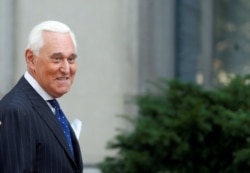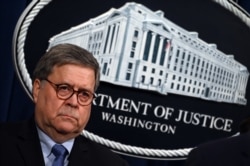A federal judge is refusing to postpone the sentencing of Roger Stone, a close friend and confidant of U.S. President Donald Trump who was convicted of obstruction of justice and witness tampering, among other offenses, despite the president saying the conviction should be thrown out.
Judge Amy Berman Jackson said during a conference call Tuesday with Stone and his lawyers that the sentencing will take place on Thursday as planned.
But Jackson appeared to say that she could put off an order for Stone to begin his sentence after Stone's lawyers requested a new trial.
That request came after Trump tweeted his belief last week that the foreperson on the Stone jury was "unambiguously" biased — an opinion he re-tweeted Tuesday after a commentator on the cable network Fox News also said Stone deserved a new trial.
"Madam foreperson, your (sic) a lawyer, you have a duty, an affirmative obligation to reveal to us when we selected you the existence of these tweets in which you were so harshly negative about the president and the people who support him," Trump said in his own tweet.
"Pretty obvious he should get a new trial. I think almost any judge in the country would order a new trial. I'm not so sure about Judge Jackson, though," he added.
When reporters asked Trump if he plans to pardon Stone, he replied that he "hadn't given it any thought ... but I think he's been treated very unfairly."
Trump said Tuesday he chose not to get involved in the Stone case, but said he is allowed to be "totally involved," if he wanted to, claiming he is "the chief law enforcement officer of the country."
Allegations of political influence
Trump's very public comments about the Stone case and his open criticism of a federal judge are at the very center of allegations of political influence into what has historically been an independent Justice Department.
The controversy blossomed in full last week when Attorney General William Barr and other top Justice Department officials stunningly overruled their own prosecutors and recommended a lighter prison sentence for Stone, who was convicted of lying to Congress, witness tampering, and obstruction of justice stemming from the 2016 Russian election meddling probe.
Prosecutors in the case had recommended seven to nine years prison time for Stone — a recommendation based on sentencing guidelines for such crimes.
But the Justice Department recommended a lighter sentence after Trump complained in a tweet that the seven to nine years would be "horrible" and "unfair."
Three prosecutors in the Stone case withdrew, and a fourth quit the department altogether.
A national association of federal judges will hold an emergency meeting Wednesday, the head of the organization told VOA.
District court Judge Cynthia Rufe, president of the Federal Judges Association, said the judges are "concerned about the attacks on individual judges" and that will be the main issue to be discussed.
Rufe declined to give any more details, but said the jurists "could not wait" until their spring meeting. She says the Federal Judges Association has no interest in getting involved in the Stone case, but does support Jackson.
"We are supportive of any federal judge who does what is required," she said.
Former President Barack Obama appointed Jackson, and Trump has been notoriously critical of nearly every major decision and policy made by his predecessor. Trump also complained last week about Jackson's decision to jail former Trump campaign chairman Paul Manafort in solitary confinement and not to try to prosecute former Democratic presidential candidate Hillary Clinton.
Trump congratulated Attorney General Barr last week for "taking charge" of the Stone case. Both deny that Trump asked Barr to intervene. Barr is scheduled to appear before the House Judiciary Committee next month.
More than 2,000 former Justice Department officials have called on Barr to resign, saying his handling of the Stone case "openly and repeatedly flouted" the independence of the judicial branch.
Barr told the U.S. television network ABC News last week that Trump's tweets "make it impossible for him to do his job," saying he will not be "bullied or influenced by anybody, whether it's Congress, a newspaper editorial board, or the president."
Trump acknowledged Tuesday that he does make Barr's job "harder," but calls him a man of "great integrity" who is up against people who "don’t want to see good things happen."
VOA's Mary Motta contributed to this report.



